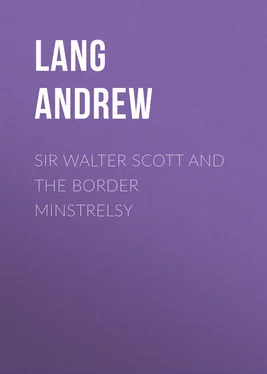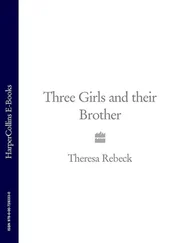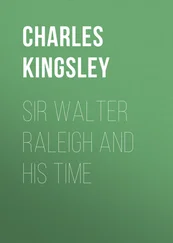Andrew Lang - Sir Walter Scott and the Border Minstrelsy
Здесь есть возможность читать онлайн «Andrew Lang - Sir Walter Scott and the Border Minstrelsy» — ознакомительный отрывок электронной книги совершенно бесплатно, а после прочтения отрывка купить полную версию. В некоторых случаях можно слушать аудио, скачать через торрент в формате fb2 и присутствует краткое содержание. Жанр: foreign_antique, foreign_prose, на английском языке. Описание произведения, (предисловие) а так же отзывы посетителей доступны на портале библиотеки ЛибКат.
- Название:Sir Walter Scott and the Border Minstrelsy
- Автор:
- Жанр:
- Год:неизвестен
- ISBN:нет данных
- Рейтинг книги:5 / 5. Голосов: 1
-
Избранное:Добавить в избранное
- Отзывы:
-
Ваша оценка:
- 100
- 1
- 2
- 3
- 4
- 5
Sir Walter Scott and the Border Minstrelsy: краткое содержание, описание и аннотация
Предлагаем к чтению аннотацию, описание, краткое содержание или предисловие (зависит от того, что написал сам автор книги «Sir Walter Scott and the Border Minstrelsy»). Если вы не нашли необходимую информацию о книге — напишите в комментариях, мы постараемся отыскать её.
Sir Walter Scott and the Border Minstrelsy — читать онлайн ознакомительный отрывок
Ниже представлен текст книги, разбитый по страницам. Система сохранения места последней прочитанной страницы, позволяет с удобством читать онлайн бесплатно книгу «Sir Walter Scott and the Border Minstrelsy», без необходимости каждый раз заново искать на чём Вы остановились. Поставьте закладку, и сможете в любой момент перейти на страницу, на которой закончили чтение.
Интервал:
Закладка:
Mr. Child, says his friend and pupil, Professor Kittredge, “possessed a kind of instinct” for distinguishing what is genuine and traditional, or modern, or manipulated, or, if I may say so, “faked” in a ballad.
“This instinct, trained by thirty years of study, had become wonderfully swift in its operations, and almost infallible. A forged or retouched piece could not escape him for a moment: he detected the slightest jar in the ballad ring.” 10 10 Child, vol. i. p. xxx.
But all old traditional ballads are masses of “retouches,” made through centuries, by reciters, copyists, editors, and so forth. Unluckily, Child never gave in detail his reasons for rejecting that treasure of Sir Walter’s, Auld Maitland . Child excluded the poem sans phrase . If he did this, like Falstaff “on instinct,” one can only say that antiquarian instincts are never infallible. We must apply our reason to the problem, “What is Auld Maitland ?”
Colonel Elliot has taken this course. By far the most blighting of the many charges made by Colonel Elliot against Sir Walter Scott are concerned with the ballad of Auld Maitland . 11 11 Minstrelsy , 2nd edition, vol iii. (1803).
After stating that, in his opinion, “several stanzas” of the ballad are by Sir Walter himself, Colonel Elliot sums up his own ideas thus:
“My view is that Hogg, in the first instance, tried to palm off the ballad on Scott, and failed; and then Scott palmed it off on the public, and succeeded.. let us, as gentlemen and honest judges, admit that the responsibility of the deception rests rather on the laird (Scott) than on the herd” (Hogg.) 12 12 Further Essays , pp. 247, 248.
If Colonel Elliot’s “views” were correct (and it is absolutely erroneous), the guilt of “the laird” would be great. Scott conspires with a shepherd, a stranger, to palm off a forgery on the public. Scott issues the forgery, and, what is worse, in a private letter to a learned friend, he utters what I must borrow words for: he utters “cold and calculated falsehoods” about the manner in which, and the person from whom, he obtained what he calls “my first copy” of the song. If Hogg and Scott forged the poem, then when Scott told his tale of its acquisition by himself from Laidlaw, Scott lied.
Colonel Elliot is ignorant of the facts in the case. He gropes his way under the misleading light of a false date, and of fragments torn from the context of a letter which, in its complete form, has never till now been published. Where positive and published information exists, it has not always come within the range of the critic’s researches; had it done so, he would have taken the information into account, but he does not. Of the existence of Scott’s “first copy” of the ballad in manuscript our critic seems never to have heard; certainly he has not studied the MS. Had he done so he would not assign (on grounds like those of Homeric critics) this verse to Hogg and that to Scott. He would know that Scott did not interpolate a single stanza; that spelling, punctuation, and some slight verbal corrections, with an admirable emendation, were the sum of his industry: that he did not even excise two stanzas of, at earliest, eighteenth century work.
I must now clear up misconceptions which have imposed themselves on all critics of the ballad, on myself, for example, no less than on Colonel Elliot: and must tell the whole story of how the existence of the ballad first became known to Scott’s collector and friend, William Laidlaw, how he procured the copy which he presented to Sir Walter, and how Sir Walter obtained, from recitation, his “second copy,” that which he printed in The Minstrelsy in 1803.
In 1801 Scott, who was collecting ballads, gave a list of songs which he wanted to Mr. Andrew Mercer, of Selkirk. Mercer knew young Will Laidlaw, farmer in Blackhouse on Yarrow, where Hogg had been a shepherd for ten years. Laidlaw applied for two ballads, one of them The Outlaw Murray , to Hogg, then shepherding at Ettrick House, at the head of Ettrick, above Thirlestane. Hogg replied on 20th July 1801. He could get but a few verses of The Outlaw from his maternal uncle, Will Laidlaw of Phawhope. He said that, from traditions known to him, he could make good songs, “but without Mr. Scott’s permission this would be an imposition, neither could I undertake it without an order from him in his own handwriting.. ” 13 13 Carruthers, “Abbotsford Notanda,” in R. Chambers’s Life of Scott , pp. 115–117 (1891).
Laidlaw went on trying to collect songs for Scott. We now take his own account of Auld Maitland from a manuscript left by him. 14 14 Ibid. , p. 118.
“I heard from one of the servant girls, who had all the turn and qualifications for a collector, of a ballad called Auld Maitland , that a grandfather (maternal) of Hogg could repeat, and she herself had several of the first stanzas, which I took a note of, and have still the copy. This greatly aroused my anxiety to procure the whole, for this was a ballad not even hinted at by Mercer in his list of desiderata received from Mr. Scott. I forthwith wrote to Hogg himself, requesting him to endeavour to procure the whole ballad. In a week or two I received his reply, containing Auld Maitland exactly as he had received it from the recitation of his uncle Will of Phawhope, corroborated by his mother, who both said they learned it from their father, a still older Will of Phawhope, and an old man called Andrew Muir, who had been servant to the famous Mr. Boston, minister of Ettrick.” Concerning Laidlaw’s evidence, Colonel Elliot says not a word.
This copy of Auld Maitland , with the superscription outside —
all in Hogg’s hand, is now at Abbotsford. We next have, through Carruthers using Laidlaw’s manuscript, an account of the arrival of Scott and Leyden at Blackhouse, of Laidlaw’s presentation of Hogg’s manuscript, which Scott read aloud, and of their surprise and delight. Scott was excited, so that his burr became very perceptible. 15 15 Carruthers, “Abbotsford Notanda,” in R. Chambers’s Life of Scott , pp. 115–117 (1891).
The time of year when Scott and Leyden visited Yarrow was not the autumn vacation of 1802, as Lockhart erroneously writes, 16 16 Lockhart, vol. ii. p. 99.
but the spring vacation of 1802. The spring vacation, Mr. Macmath informs me, ran from 11th March to 12th May in 1802. In May, apparently, Scott having obtained the Auld Maitland MS. in the vernal vacation of the Court of Session, gave his account of his discovery to his friend Ellis (Lockhart does not date the letter, but wrongly puts it after the return to Edinburgh in November 1802).
Scott wrote thus: – “We” (John Leyden and himself) “have just concluded an excursion of two or three weeks through my jurisdiction of Selkirkshire, where, in defiance of mountains, rivers, and bogs, damp and dry, we have penetrated the very recesses of Ettrick Forest.. I have.. returned loaded with the treasures of oral tradition. The principal result of our inquiries has been a complete and perfect copy of “Maitland with his Auld Berd Graie,” referred to by [Gawain] Douglas in his Palice of Honour (1503), along with John the Reef and other popular characters, and celebrated in the poems from the Maitland MS.” ( circ. 1575). You may guess the surprise of Leyden and myself when this was presented to us, copied down from the recitation of an old shepherd, by a country farmer.. Many of the old words are retained, which neither the reciter nor the copyer understood. Such are the military engines, sowies, springwalls (springalds), and many others.. ” 17 17 Lockhart, Life of Sir Walter Scott , Bart. , vol. ii. pp. 99, 100 (1829).
Интервал:
Закладка:
Похожие книги на «Sir Walter Scott and the Border Minstrelsy»
Представляем Вашему вниманию похожие книги на «Sir Walter Scott and the Border Minstrelsy» списком для выбора. Мы отобрали схожую по названию и смыслу литературу в надежде предоставить читателям больше вариантов отыскать новые, интересные, ещё непрочитанные произведения.
Обсуждение, отзывы о книге «Sir Walter Scott and the Border Minstrelsy» и просто собственные мнения читателей. Оставьте ваши комментарии, напишите, что Вы думаете о произведении, его смысле или главных героях. Укажите что конкретно понравилось, а что нет, и почему Вы так считаете.









